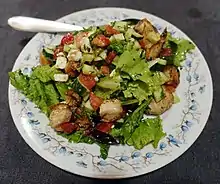Pollotarianism
Pollotarianism (also known as pollo-vegetarianism)[1] is the practice of adhering to a diet that incorporates poultry or game as the only source of meat in an otherwise vegetarian diet.[2][3]

Chicken and vegetables; foodstuffs compatible with a pollotarian diet
While "pollo" means chicken in Spanish, pollo-vegetarians are known to incorporate different forms of poultry, like duck and turkey in their diet.[4] A pollo-vegetarian may also eat dairy products.[5] The term "pollovegetarian" was first used in nutritional textbooks in the 1980s to describe a semi-vegetarian diet that incorporates poultry.[6][7] Historian Rod Preece describes pollotarians as "those who refrain from mammals but are willing to eat the flesh of birds notably chickens."[8]
See also
References
- Albala, Ken. (2015). The SAGE Encyclopedia of Food Issues, Volume 1. SAGE Publications. p. 1429. ISBN 978-14522-4301-6
- Lagua, Rosalinda T; Claudio, Virginia S. (2012). Nutrition and Diet Therapy Reference Dictionary. Chapman & Hall. p. 356. ISBN 978-94-011-6880-9
- Chakrabarty, Kaveri; Chakrabarty, A. S. (2019). Textbook of Nutrition in Health and Disease. Springer. p. 296. ISBN 978-981-15-0961-2
- Miller, Korin. (2019). "The 7 Types Of Vegetarian Diets From Lacto-Ovo To Vegan, Explained By A Nutritionist". Women's Health. Retrieved October 8, 2020.
- Hogan, Mary Ann; Wane, Daryle. (2002). Nutrition and Diet Therapy: Reviews & Rationales. Prentice Hall. p. 8. ISBN 978-0130304599
- Green, Marilyn L; Harry, Joann. (1981). Nutrition in Contemporary Nursing Practice. Wiley. p. 205. ISBN 978-0471038924
- Guthrie, Helen Andrews. (1989). Introductory Nutrition. Times Mirror/Mosby College Publishing. p. 602. ISBN 9780801622014
- Preece, Rod. (2008). Sins of the Flesh: A History of Ethical Vegetarian Thought. UBC Press. p. 14. ISBN 978-0-7748-15093
This article is issued from Wikipedia. The text is licensed under Creative Commons - Attribution - Sharealike. Additional terms may apply for the media files.